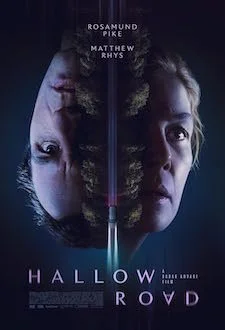Direction: Babak Anvari
Country: UK
British-Iranian director Babak Anvari proves himself a master of economy in his fourth feature, Hallow Road, an intense, low-budget parent-child psychological nightmare stripped down to just two actors: Rosamund Pike and Matthew Rhys. The pair sustain the film admirably, delivering committed if occasionally repetitive performances.
Written by William Gillies, the script follows a married couple—troubled paramedic Maddie (Pike) and overprotective father Frank (Rhys)—who receive a distressed late-night call from their 18-year-old daughter claiming she has crashed her car on a deserted woodland road. Both parents fight to maintain control, but fear and paranoia quickly take hold when they discover the road is steeped in sinister myth and lore.
Hallow Road is taut and spare, sustaining a hypnotic sense of unease that favors suggestion over revelation. Anvari builds suspense with precision, weaving a psychological trance that relies less on shocks than on atmosphere and dread. Yet, while the film gets the job done on its own terms, it lacks the spark that might have elevated it further. The ambiguous finale leaves your mind spinning more than your gut churning, as hope flickers desperately within the shadows of the woods.










